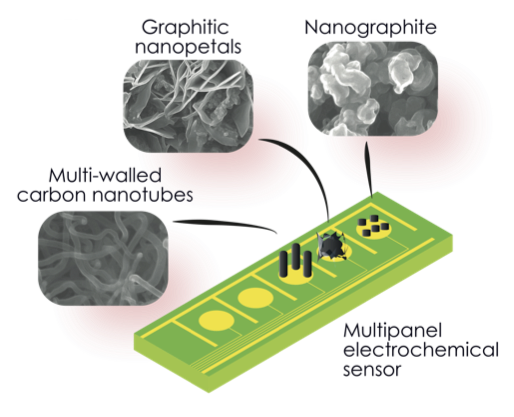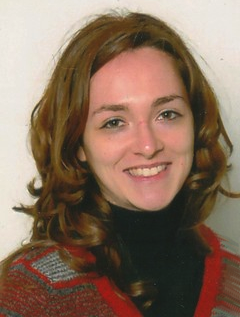Go to
July 10, 2014
Carbon nanostructured multipanel sensor for human health monitoring
Thursday, 10 July 2014 at 16:15 in INF 328
Irene Taurino, Integrated Systems Laboratory, EPFL
Abstract:
A rapid monitoring of a set of metabolites (e.g. glucose, lactate) in human fluids is of significant importance in medicine. Theoretically, instrumentation designed for a timely multi-sensing should be able to do several measurements from a small volume and undiluted sample. Consequently, the development of a tiny device is a crucial requirement. Electrochemical miniaturized devices are particularly advantageous because of the inexpensive and reproducible fabrication procedures and the simple analytical measurements. A continuing challenge in their fabrication is the detection of biomolecules in the physio-pathological concentration range. To this end, carbon nanomaterials are considered due to their high electrocatalytic activity, large surface area and good support for enzyme immobilization.

Multisite electrochemical sensor incorporating microelectrodes modified with CVD grown carbon nanomaterials
In order to implement a full parallel process, the integration of carbon nanomaterials on microsurfaces should be compatible with the low-cost CMOS technology. Conversely, conventional nanostructuration approaches are time-consuming, expensive, and hardly reproducible and require additives (e.g. polymers) that mask the nanomaterial promising properties and compromise the time-stability of the device due to the binder-matrix instability in aqueous environments. We considered the selective CVD growth of carbon nanomaterials as one of the most promising method to enable a close coupling nanomaterial-electrode. A CVD system normally works at temperatures too high (600 - 750 oC) to be compatible with CMOS processes. In the present talk, I will describe a versatile protocol to integrate a wide range of carbon nanomaterials onto an array of Pt microelectrodes of a device by a CVD process down to 450 oC. The nanostructured sensor exhibits excellent sensing parameters by both direct detection of electroactive metabolites and sensing mediated by an enzyme.
About the speaker:
 Irene Taurino was born in Leverano, Italy in 1986. She received the B.Sc. and the M.Sc. degree in Biomedical Engineering both cum laude from Politecnico di Torino (Italy) in 2008 and 2010, respectively. She also got the M.Sc. degree in Biomedical Engineering from Politecnico di Milano (Italy) in 2010. She carried out her Master thesis at EPFL in collaboration with Politecnico di Torino working on carbon nanotube-based biosensors. Currently she is doctoral assistant in the Integrated System Laboratory (LSI) under the supervision of Sandro Carrara and Giovanni De Micheli.
Irene Taurino was born in Leverano, Italy in 1986. She received the B.Sc. and the M.Sc. degree in Biomedical Engineering both cum laude from Politecnico di Torino (Italy) in 2008 and 2010, respectively. She also got the M.Sc. degree in Biomedical Engineering from Politecnico di Milano (Italy) in 2010. She carried out her Master thesis at EPFL in collaboration with Politecnico di Torino working on carbon nanotube-based biosensors. Currently she is doctoral assistant in the Integrated System Laboratory (LSI) under the supervision of Sandro Carrara and Giovanni De Micheli.
Secondary navigation
- January 29, 2018
- August 30, 2017
- Past seminars
- 2016 - 2017 Seminars
- 2015 - 2016 Seminars
- 2014 - 2015 Seminars
- 2013 - 2014 Seminars
- 2012 - 2013 Seminars
- 2011 - 2012 Seminars
- 2010 - 2011 Seminars
- 2009 - 2010 Seminars
- 2008 - 2009 Seminars
- 2007 - 2008 Seminars
- 2006 - 2007 Seminars
- August 31, 2007
- June 29, 2007
- June 20, 2007
- June 5, 2007
- May 30, 2007
- May 16, 2007
- May 15, 2007
- April 24, 2007
- March 27, 2007
- March 14, 2007
- February 9, 2007
- February 8, 2007
- January 12, 2007
- December 5, 2006
- November 14, 2006
- October 31, 2006
- October 27, 2006
- October 26, 2006
- October 20, 2006
- September 20, 2006
- September 20, 2006
- September 20, 2006
- September 19, 2006
- 2005 - 2006 Seminars
- August 23, 2006
- August 22, 2006
- June 26, 2006
- June 20, 2006
- June 16, 2006
- June 7, 2006
- June 6, 2006
- May 30, 2006
- May 17, 2006
- May 10, 2006
- April 27, 2006
- April 12, 2006
- March 31, 2006
- March 29, 2006
- March 22, 2006
- March 15, 2006
- February 27, 2006
- February 8, 2006
- January 25, 2006
- January 19, 2006
- January 18, 2006
- January 17, 2006
- January 11, 2006
- November 30, 2005
- November 23, 2005
- November 2, 2005
- October 26, 2005
- October 25, 2005
- October 5, 2005
- September 28, 2005
- 2005 Seminars

